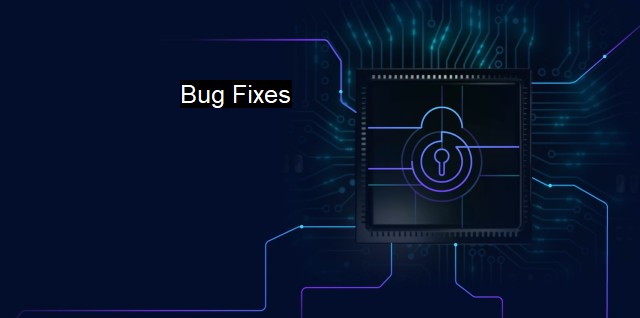What are Bug Fixes?
The Importance of Bug Fixes in Ensuring Cybersecurity and Antivirus Protection
In the realm of cybersecurity and antivirus systems, the term "bug fixes" is of significant importance. A bug in this context refers to an error, flaw or fault in a computer program or system that causes it to produce incorrect or unexpected results, or to behave in unintended ways. Bug fixes, consequently, are the corrections or remedies for these anomalies, improving the functionality and security aspect of computer software.The world of software is never perfect; bugs are inevitable in coding. Their presence compromises the software’s security, its ability to fight malware, and sometimes its essential functioning. this inability of software to act as required exposes system vulnerabilities, making them an easy target for hackers.
In the industry, few terms are as nearly ubiquitous as "bug". As software becomes increasingly complex, the likelihood of their presence rises significantly. Owing to this high probability, cybersecurity professionals (along with software developers and certain savvy users) keep track of the common bugs that become exploitable vulnerabilities. Subsequently, they also formulate and try out possible bug fixes.
A bug fix can involve making small adjustments to the program, or changing a single or few lines of code, which were previously overlooked or incorrectly programmed. Sometimes a bug fix amounts to deleting unnecessary code. They're typically released as minor version updates, not new versions of the software.
The update carried within a bug fix often relates directly to the inherent security aspects of a program. For instance, in antivirus software, a bug could render the software completely useless, where it is unable to detect and combat harmful malware, leaving the system exposed to possible attacks. Detecting and addressing these flaws is, therefore, of paramount importance.
These corrections may also help to reduce the risk of unauthorized access, data leakage, and other threats that can compromise the integrity of a user's data or the performance of the user's device. It ensures that the software’s built-in protective and preventive measures work as designed, protecting data against cyber threats, enhancing the user experience, and instilling confidence in the system.
Bug fixes are highly encouraged to be implemented immediately as they not only improve the performance of the software but also make the system robust against cyber attacks. Interestingly, a swift response to bug fixes could also counter zero-day attacks, i.e., cyber attacks that occur the same day a software weakness is discovered - before a solution becomes available.
The identification of these bugs and the resolutions provided demonstrate an ongoing battle against cybersecurity threats. Traditional reactive measures after a cyberattack are increasingly replaced with more proactive strategies of bug fixing. This paradigm shift within cybersecurity showcases the constant vigilance and innovative methods needed to stay one step ahead of cyber threats.
Having reliable developers who actively pursue these threats and work on bug fixes while proactively seeking potential flaws is an essential link in the chain of cyber protection. Experts worldwide continually endeavour to keep software systems sanitized, often deploying automated tools that can help predict and identify possible susceptibility due to bugs.
While the sheer volume and variety of bugs identified can seem disconcerting, bug fixes are proof of a system's improvement, a testament to its evolving sophistication. This evolutionary context emphasizes the importance of a solid software design, continuous monitoring, regular software updates and most importantly, timely bug fixes. Although perfect software without bugs is an extreme rarity, constant vigilance allows for quick detection and remediation of bugs, leading to robust software. Therefore, bug fixes are crucial to maintain a safe, secure, and efficient cyber environment. To stress the importance succinctly, behind every bug fix is an attempt to seal a vulnerability, remedy a fault and deny hackers a possible point of exploitation.

Bug Fixes FAQs
What are bug fixes in the context of cybersecurity and antivirus?
Bug fixes are updates to software programs, including cybersecurity and antivirus, that address coding errors and vulnerabilities that can lead to security breaches, data loss or corruption, and system crashes.Why are bug fixes important in cybersecurity and antivirus?
Bug fixes are important in cybersecurity and antivirus because they prevent hackers and cybercriminals from exploiting vulnerabilities in the software, which can lead to malware infections, data theft, and other security incidents.How do I know if a bug fix is available for my cybersecurity or antivirus software?
Most cybersecurity and antivirus software programs automatically notify users of available updates and bug fixes. Alternatively, you can check the software vendor's website or support center for information about available updates and how to install them.What should I do if I encounter a bug or vulnerability that is not addressed by a bug fix?
If you encounter a bug or vulnerability that is not addressed by a bug fix, you should report it to the software vendor or developer as soon as possible. This can help them identify and address the issue, and prevent other users from being affected by it. You can also consider switching to a different cybersecurity or antivirus software that may be more secure and reliable.| | A | | | B | | | C | | | D | | | E | | | F | | | G | | | H | | | I | | | J | | | K | | | L | | | M | |
| | N | | | O | | | P | | | Q | | | R | | | S | | | T | | | U | | | V | | | W | | | X | | | Y | | | Z | |
| | 1 | | | 2 | | | 3 | | | 4 | | | 7 | | | 8 | | |||||||